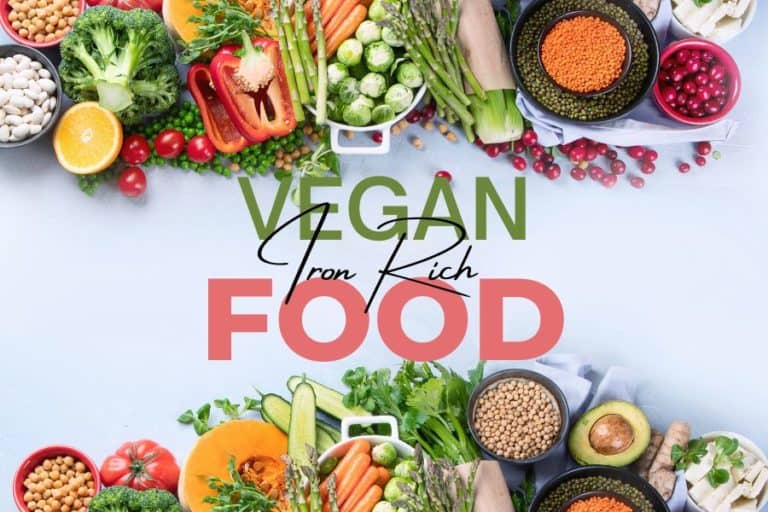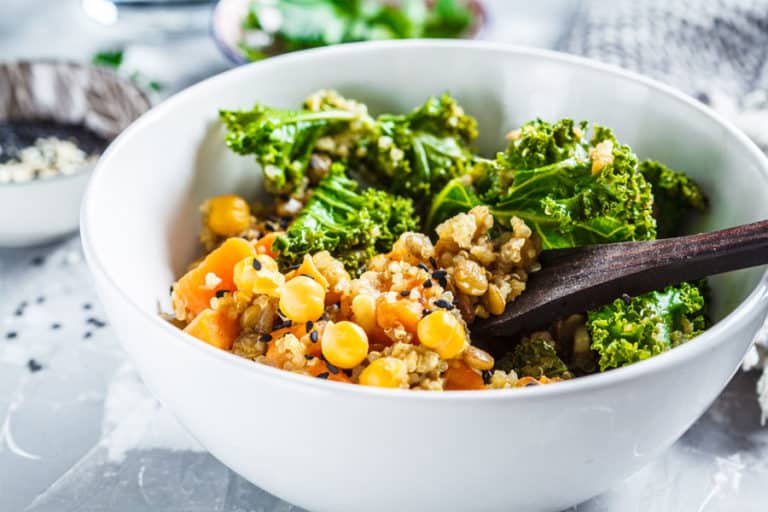Omega 3 Vegan Foods You Need To Incorporate Into Your Diet

Overview | omega 3 vegan foods | Supplements | Recommendation | Importance | Plant vs fish-based omega-3s
As a vegan, it’s important as well as challenging to ensure you get all the nutrients your body needs to function healthily. This includes nutrients like omega-3 fatty acids, essential for maintaining heart health, brain function, and more.
While omega-3s are typically found in fish and other animal products, there are actually a number of plant-based foods that are rich in this essential nutrient.
This article lists the best omega 3 vegan foods you need to incorporate into your vegan diet.
Omega-3: A brief overview
Omega-3 is a type of polyunsaturated fatty acid [1]Harvard T.H. Chan: Omega-3 Fatty Acids: An Essential Contribution that is essential for human health. The three main omega-3 fatty acids are:
- ALA (alpha-linolenic acid)
- EPA (eicosapentaenoic acid)
- DHA (docosahexaenoic acid)
Generally, ALA is found in plant sources, while EPA and DHA are largely found in animal foods. The human body can convert ALA into EPA, which in turn gets converted into DHA.
However, our body’s capacity to convert ALA tends to be limited. In the absence of enough EPA and DHA-rich foods or supplements, our bodies can suffer from deficiencies.
Since vegans only get ALA from their diets, they are at a high risk of being deficient in other essential fatty acids.
This can be extremely risky for anyone. The human body needs omega-3 fatty acids for many reasons, such as maintaining your brain and heart health. In addition, these are central to keeping your inflammatory response in check.
Omega-3 fats are also essential for pregnant women and growing babies. It is crucial for the healthy growth and development of the body.
Omega 3 Vegan Foods
Omega-3s are a kind of essential fatty acid that our bodies can’t make on their own. We must get them from our diet.
Because the body cannot convert plant-based omega-3 fatty acids as efficiently as it can animal-based ones, vegans should aim to consume slightly more than non-vegans.
Vegans need to be especially aware of getting enough omega-3s because they are not getting them from animal sources like fatty fish or fish oil supplements.
The best way for vegans to get omega-3s is through dietary supplements or by eating omega-3-fortified foods. Here are some omega–3 rich vegan foods:
1. Flax seeds
Flaxseeds are an excellent source of omega-3s, with a single tablespoon providing around 1.8 grams. They’re also a good source of fiber and protein, making them a nutrient-dense addition to any meal or snack. You can add flaxseeds to smoothies, oatmeal, yogurt, baked goods, and more. Just be sure to grind them first to release their nutrients; whole flax seeds will pass right through your system without being absorbed.
2. Chia seeds
Like flaxseeds, chia seeds are also rich in omega-3s, fiber, and protein. One ounce of chia seeds contains 6.72g of omega-3 fatty acids. You can use them to make chia pudding or use them as an egg replacement in baking.
3. Hemp seeds
One tablespoon of hemp seeds provides around 3.8 grams. Hemp seeds are also a good source of magnesium, iron, and zinc. You can add hemp seeds to smoothies, yogurts, salads, soups, and more. They can also be used to make hemp milk or flour.
4. Walnuts
A single cup of walnuts provides around 42 grams of omega-3. Walnuts are also a good source of copper and manganese.
You can eat them on their own as a snack, add them to trail mix or granola bowls, use them as a topping for oatmeal or salads, or even make your own vegan walnut butter at home.
5. Brussels sprouts
You may not think of brussels sprouts as being high in omega-3s, but 100 grams of Brussels sprouts actually have around 0.20 grams. Brussels sprouts are also a good source of vitamins C and K, fiber, and manganese.
They can be enjoyed roasted, steamed, sautéed, or even raw in salads. Try pairing them with another source of omega-3s, like chia seeds or walnuts, for an extra nutrient boost.
6. Spirulina
While technically not a food since it’s sold in powder form, spirulina is worth mentioning here because it’s an incredibly rich source of omega-3s.
Spirulina is also high in iron, calcium, magnesium, and vitamins A, B1, B2, B6, and B12.
Spirulina has a slightly algae-like taste, so it’s best added to smoothies or other strong-flavored drinks. You can also add it to soups or sauces for an extra nutrient boost.
7. Seaweed and algae/Algal oil
Seaweed is a type of algae that grows in saltwater. It’s a rich source of omega-3 fatty acids, vitamins, minerals, and fiber.
Seaweed is often consumed in nori rolls (used to make sushi) or as a seasoning for other dishes. It’s also available in supplement form.
Algal oil [2]ScienceDirect: Algal Oils is made from microalgae and is rich in docosahexaenoic acid (DHA), an omega-3 fatty acid that’s important for brain development. Algal oil is available in capsules or liquids and can be used in cooking or added to smoothies.
8. Perilla oil
Perilla oil is made from the seeds of the plant Perilla frutescens. It’s a good source of alpha-linolenic acid (ALA), an omega-3 fatty acid that’s converted into DHA by our bodies. In comparison to other plant oils, perilla seed oil contains some of the highest proportions of omega-3 fatty acids (ALA), usually 54% to 64% [3]National Library of Medicine: Health effects of omega-3,6,9 fatty acids: Perilla frutescens is a good example of plant oils.
9. Canola oil
Canola oil is made from the crushed seeds of the canola plant (Brassica napus L). One tablespoon of canola oil might contain around 3.93 grams of omega-3 fats. It has a neutral taste that makes it versatile for cooking or baking.
Canola oil has a relatively low smoke point, so it’s best suited for uses like dressings or marinades where it won’t be heated to high temperatures. It has a neutral flavor and can be used in a variety of other ways, such as frying, sautéing, or baking.
10. Wheat germ
Wheat germ is the innermost part of the wheat grain that contains vitamins, minerals, protein, and essential fatty acids—including ALA.
Wheat germ can be added to cereals, oatmeal, baked goods, smoothies, or yogurt to boost the nutritional content. The only drawback is that wheat germ requires refrigeration to prevent oxidation and rancidity.
11. Kidney beans
Kidney beans are an excellent source of plant-based protein and fiber as well as several vitamins and minerals—including magnesium, potassium, iron, copper, manganese, thiamin (vitamin B1), riboflavin (vitamin B2), vitamin B6, folate (vitamin B9), phosphorus, and zinc.
They also contain small amounts of ALA omega-3 fatty acids. Kidney beans can be cooked and added to soups, salads, chili, or rice dishes.
12. Edamame
Edamame beans are immature soybeans still in their pods. They’re popular in Asian cuisine and can be steamed, boiled, or stir-fried.
Edamame is an excellent source of omega – 3 fatty acids (mainly ALA). They also contain protein, fiber, vitamins, and minerals, including calcium, iron, magnesium, phosphorus, potassium, sodium, zinc, copper, manganese, selenium, and vitamin K1 (phylloquinone).
13. Fortified foods
Some plant-based foods and beverages (such as soy milk, tofu, bread, and cereal) are fortified with omega-3s from algae or flaxseeds. These products can be a good way to get your daily dose of omega-3s if you’re following a vegan diet.
Check product labels carefully because not all brands offer these nutrients. You can also find foods & beverages fortified with omega – 3 fatty acids, such as some breakfast cereals & juices.
Vegan omega-3 supplements
Vegans can consider getting their recommended daily intake of this important nutrient by taking a vegan supplement. Algae oil and ALA supplements are two vegan-friendly options that provide the body with the omega-3s. Let’s take a closer look at these two types of omega-3 supplements.
Algae oil supplements
Algae oil is an excellent source of omega-3s for vegetarians and vegans since there is no risk of consuming mercury or other pollutants that are often found in fish oil. Algae oil supplements are also free of the fishy smell and aftertaste that some people find unappealing.
ALA supplements
ALA, or alpha-linolenic acid supplements, are generally less expensive than other types of omega-3 supplements. One downside to taking an ALA supplement is that the body has to convert it into EPA and DHA, which are the forms of omega-3s that are most beneficial to the body. However, this conversion process is not very efficient, so vegans who take an ALA supplement may need to take a higher dose to get the desired effects.
How much omega-3s do I need?
Out of all the fatty acids, experts have only established a recommended amount for ALA. The table below displays the average daily recommended intake of ALA [4]National Institutes of Health: Omega-3 Fatty Acids in grams. The amount you need varies depending on your age and sex.
| Life Stage | Recommended Amount of ALA |
| Birth to 12 months* | 0.5 g |
| Children 1–3 years | 0.7 g |
| Children 4–8 years | 0.9 g |
| Boys 9–13 years | 1.2 g |
| Girls 9–13 years | 1.0 g |
| Teen boys 14–18 years | 1.6 g |
| Teen girls 14–18 years | 1.1 g |
| Men | 1.6 g |
| Women | 1.1 g |
| Pregnant teens and women | 1.4 g |
| Breastfeeding teens and women | 1.3 g |
The importance of omega-3s for vegans
As a vegan, it’s important to make sure that you’re getting all the nutrients your body needs to function at its best. One nutrient that’s often overlooked is omega-3 fatty acids.
While omega-3s are found in abundance in fish and other animal products, they can be harder to come by if you don’t eat those foods.
Omega 3 fatty acids offer a host of health benefits. Here’s a closer look at some of these benefits.
1. Cardiovascular system
One of the most well-known benefits of omega-3 fatty acids is their ability to support heart health. Numerous studies have shown that omega-3s [5]University of Rochester Medical Center: Omega-3 Fatty Acids and Coronary Heart Disease can help lower blood pressure and heart rate and prevent arrhythmias.
Omega-3s can also help reduce the risk of developing heart disease by reducing bad cholesterol levels and lowering triglycerides.
2. Pulmonary system
Omega 3 fatty acids also have a positive impact on the functioning of the lungs. These fats can reduce airway inflammation in asthmatics and may even improve exercise-induced bronchoconstriction. Omega 3s have also been shown to decrease the incidence of asthma attacks.
3. Immune system
Chronic inflammation has been linked to numerous diseases, including heart disease, cancer, arthritis, diabetes, Crohn’s disease, and more. People who take omega–3 supplements or eat foods rich in omega–3s have a lower risk of developing these conditions.
Omega 3 has immunomodulatory effects and can help to reduce inflammation throughout the body. A study published in the British Journal of Pharmacology [6]British Pharmacological Society: Omega-3 polyunsaturated fatty acids and inflammatory processes: nutrition or pharmacology? indicates that consuming EPA and DHA at a rate of more than 2 grams per day is necessary to achieve anti-inflammatory benefits in adults.
4. Endocrine system
The endocrine system is responsible for producing hormones that regulate metabolism, growth, reproduction, and mood.
Omega 3s have been shown to support healthy endocrine function. Additionally, these fats can help to regulate hormone levels connected to fertility.
5. Mental health
Omega-3 fats are essential for brain development and function throughout your life. They help improve cognitive function, mood, and memory.
One study showed that people who ate a diet rich in omega–3 fatty acids in the early stages of dementia [7]Alzheimer’s Society: Omega-3 and dementia showed signs of improvement and better memory recall.
Studies have shown that omega-3 can improve symptoms of depression, anxiety, and a number of other neuropsychiatric disorders. This effect is mediated by the action of omega-3 on neurotransmitters such as serotonin and dopamine [8]National Library of Medicine: Omega-3 Fatty Acids and Depression: Scientific Evidence and Biological Mechanisms.
Are plant-based omega-3 sources different from fish-based sources?
Let’s briefly compare the benefits and drawbacks of both plant-based and animal-based omega-3s:
Fish-based omega-3
Fish-based omega-3s, such as EPA and DHA, are generally considered to be more effective than plant-based omega-3s, such as alpha-linolenic acid (ALA).
Fish-based essential fatty acids have been linked to better heart and brain health, fetal growth, reduced inflammation, and more.
On the other hand, fish may also contain mercury and other toxins, which can be harmful to the body. Vegans also question the environmental cost of fish-based omega-3 supplementation.
Plant-based omega-3
There are some concerns about the safety of plant-based omega-3 supplements.
Omega-3 Fatty Acids and Depression study found that taking high doses of plant-based omega-3 supplements may increase the risk of bleeding. This is likely due to the fact that plant-based omega – 3s can inhibit blood clotting.
Nevertheless, plant-based omega-3s do offer some unique benefits. For example, plant-based omega – 3s are generally considered more sustainable than fish-based omega – 3s. They’re also usually cheaper and safer for people with seafood allergies.
Note: It’s important to speak to a doctor before taking any kind of omega – 3 supplement – especially if you’re taking other medications or have a medical condition.
Conclusion
Omega-3 fatty acids are an important part of a healthy diet. While you can get some omega 3s from plant sources, it’s difficult to get enough DHA and EPA from plant sources alone.
Consuming omega-rich vegan foods and taking a plant-based omega-3 supplement is a good way to ensure you get enough of these essential fatty acids. You can also look for foods that have been fortified with omega-3s to help meet your needs.
References
| ↑1 | Harvard T.H. Chan: Omega-3 Fatty Acids: An Essential Contribution |
|---|---|
| ↑2 | ScienceDirect: Algal Oils |
| ↑3 | National Library of Medicine: Health effects of omega-3,6,9 fatty acids: Perilla frutescens is a good example of plant oils |
| ↑4 | National Institutes of Health: Omega-3 Fatty Acids |
| ↑5 | University of Rochester Medical Center: Omega-3 Fatty Acids and Coronary Heart Disease |
| ↑6 | British Pharmacological Society: Omega-3 polyunsaturated fatty acids and inflammatory processes: nutrition or pharmacology? |
| ↑7 | Alzheimer’s Society: Omega-3 and dementia |
| ↑8 | National Library of Medicine: Omega-3 Fatty Acids and Depression: Scientific Evidence and Biological Mechanisms |







